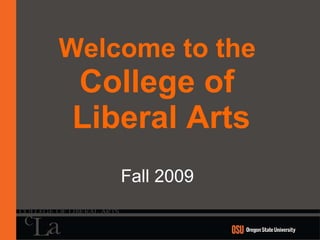Forestry
- 1. Welcome to the College of Liberal Arts Fall 2009
- 2. Academic Departments Fine Arts Humanities Social Sciences Interdisciplinary Art English Anthropology American Studies Graphic Design Foreign Languages and Literatures Economics Ethnic Studies Music History Political Science New Media Communication Theatre Arts Philosophy Psychology Women Studies Speech Communication Sociology Liberal Studies Art History
- 3. What is a Liberal Arts Education? Thinkers Creators Citizens Leaders
- 4. Academic Success Everybody starts college with a new GPA. You have a CLEAN SLATE. Most of you had a 3.0 + GPA in high school. Get to know your faculty/instructors. Connect with Advisers. Successful time management is KEY.
- 6. What goes into a Liberal Arts degree?
- 7. Liberal Arts Packet Guide to Graduation What is the purpose of the Baccalaureate Core? To learn more about other areas outside your major To explore potential majors or minors To work on the skills necessary to succeed in college To expose you to the notions of cultural diversity and difference, power and discrimination
- 8. Liberal Arts Packet Class Selection 101 *Alpha Sectioning Major Classes for Freshmen Department Contacts/ Registration Dates International Degree Advisor/Advisee Responsibilities
- 9. Advice from Graduating Seniors
- 10. Top 10 Employer Valued Skills Communication Skills Honesty and Integrity Teamwork Interpersonal Skills Motivation/Initiative Strong Work Ethic Analytical Skills Flexibility/Adaptability Computer Skills Organizational Skills
- 11. What will happen tomorrow? Actively participate - Ask questions (Not your parents) Student Responsibility Adviser Responsibility Parent Responsibility
- 12. Important Technical InfoŌĆ”. Important Numbers you need to Know Student ID /GAP PIN (given to you by your advisor) Math placement Foreign Language Placement AP/Transfer credits? U-Engage, Dept. Orientation classes Online schedule of classes ONID account Word of the day ŌĆ” the ŌĆ£FŌĆØ word ŌĆ£ F-L-E-X-I-B-I-L-I-T-YŌĆØ START Checklist
- 13. ╠²
- 14. Take advantage of your OPPORTUNITIES! ~Get Involved~
Editor's Notes
- #2: This presentation will describe the development and implementation of an advising model used to work with first-term, true first year students placed on Academic Warning in the College of Liberal Arts at Oregon State University. Often students who encounter academic difficulty in their first term in college will have progressively worse academic issues in their future. This model was implemented in hopes of stopping that downward cycle, to help these students identify issues (academic and non-academic) that influence their college experience, and connect them to resources on campus. This presentation is an exploration of how the model was developed, how it has been implemented, and its success so far. If you are in similar situations, hopefully you will be able to learn from this model and potentially apply it at your institutions.













